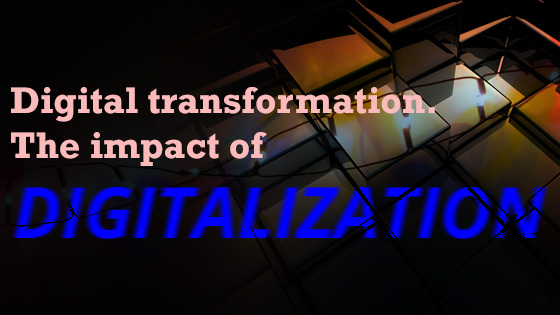Digital transformation: The impact of digitalization
The funny thing about transformation is that it happens in increments; one expects a complete overhaul, but piece by piece everything changes around us, and it is only when the last pieces are being removed we realize that things have truly changed. Look at computers; no one today can say that our world hasn’t been transformed by computers. Yet, there was no single point in the past 3 decades which you can claim as the transformative point; instead, slowly computers became smaller and cheaper, the internet was a strange way to chat with people around the world, and somehow we came to smartphones and smart cars.
That, however, isn’t true if you are a leader. If you are a leader then you cannot be a passive recipient of society changing around you. If you are a leader then you need to anticipate the changes and change course accordingly. There are companies right now that didn’t even exist before the information technology age, yet are now the biggest companies in the world. There are also companies who used to be giants but are barely surviving at this point. The difference between both was simply leadership. Leadership needed to understand that the world was changing around them and that they needed to change accordingly.
Change is constant; everyone knows that change will happen, and that something must be done about it. Leaders need to look at how much of a change their organization needs. Digitalization has slowly penetrated the many different layers of an organization and is now successfully changing the core of the business. A company might change its customer experience, it might change its customer experience, it might change the way it operates, or it might end up changing the core business model. Only a deep study of the organization’s current state can lead to results which would allow successful digitalization.
Changing the Customer Experience
When it comes to customer experience, the impact of digitalization is clear. We can simply look at how differently we work with all the companies we buy products and services from. Our banks are online; we make reservations online, and much more. Almost every company these days has had to transform its customer experience because the alternative was to lose customers. The days when customers had to wait for a long time on call are a thing of the past; now you can directly get information on your account from internet portals, you can simply send an email or text message for support, and you can easily get more information from the product’s website. Companies which were slow on the uptake of technology in customer communication paid the price. That’s why these days one of the best ways to complain to a huge corporation is to simply send a 140 character tweet at them.
Changing the way the company operates
Companies then started to change how they did what they did. It’s is easy to see the transformation that has occurred in operations. Companies are now powered by huge information systems. Most companies these days wouldn’t even be able to operate if their servers were down; digitalization has become an important part of the way they operate. It is easy for companies to justify the big price tag of such systems because the results are great. Using a digital system to run the organization isn’t just blazingly fast; it also starts to payoff very soon.
Companies are using these systems to drive them forward. Companies use trend analysis and compute predictions using the data provided by these systems. If your company is still only using technology to work the way you used to then you’re doing it wrong. Companies need to rethink everything they do and integrate technology into it. The increase in efficiency and quality is too enormous to be ignored.
Changing what the company is
Digitalization has had a negative impact on some companies. Post offices are a great example of a company’s core business becoming redundant. People sending letters to their loved ones became a thing of the past once everyone got email. A huge source of income for post offices is now closed forever. A post office now has to transform itself into something which people want. Many post offices are now focused on more sentimental offerings; they’re betting on the idea that if they can’t convince you to send some a letter, maybe they can convince you to send a cake or gift to someone on their birthday.
True leaders need to see if technology will in any way upend their core business. If there is even a slight chance of this happening, the leaders need to transform their company. Instead of becoming obsolete by new technology, they must integrate the new technology and find new possibilities.



